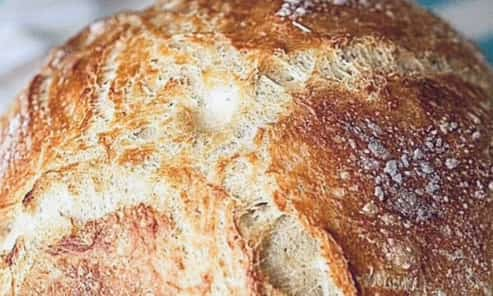Ingredients
Hot water: 1 and a half cups (370 milliliters)
Yeast in powder form: 2 tablespoons (10 g)
Flour: 4 cups (500 g)
Salt: 1 tsp
Preparation
Make the Yeast Work:
In a big bowl, mix together lukewarm water (370 ml) and dry yeast (10 g). Stir softly and leave it for 5-10 minutes until the yeast is completely dissolved and bubbly.
Make the dough:
Put 500 grams of flour and 1 teaspoon of salt into the yeast mixture. Stir with a wooden spoon or your hands until a lumpy dough is made.
Work the dough by kneading it.
Move the dough to a surface with a little flour and work it by hand for 8-10 minutes until it is soft and stretchy. If the dough is too wet, put in a bit more flour, one spoonful at a time.
Beginning:
Put the dough in a clean bowl with a little oil, cover it with a wet cloth, and leave it in a warm spot for 1-2 hours until it doubles in size.
Form the dough.
Press the dough that has risen to remove any air bubbles. Form the dough into a loaf or the shape you want, then place it on a baking sheet lined with parchment paper or in a loaf pan that has been greased.
Second Rise: A New Beginning
Cover the dough with a cloth and let it grow for another 30-45 minutes, or until it has doubled in size.
Make the bread.
Heat your oven to 200°C (400°F) before using it. Cook the bread in the oven for 25-30 minutes, or until the crust is a golden brown color and the loaf sounds hollow when you tap the bottom.
Chill and serve:
Take the bread out of the oven and allow it to cool on a wire rack before cutting it. Enjoy your freshly baked bread either warm or at room temperature!
Advice:
To make the crust softer, apply melted butter on top of the bread after it is baked.
Include seeds or herbs in the dough for more taste.
Why You’ll Enjoy This Recipe
Simple to prepare with basic ingredients.
Great for people who are just starting.
Smooth and fluffy inside with a crunchy outer layer.
Suitable for various kinds of bread.
Commonly Asked Questions
Can I use instant yeast instead of dry yeast?
Yes, you can use quick-rise yeast. If you use instant yeast, you don’t need to activate it separately. Just mix it directly with the dry ingredients.
How can I tell if my yeast is still good to use?
To see if your yeast is working, combine it with lukewarm water and a little bit of sugar. If it gets bubbly within 5-10 minutes, it is ready to use. If not, it might be old, and you should use a new batch.
Can I prepare this bread without gluten?
Yes, but you will have to use a gluten-free flour mix that works well for making bread. Doughs without gluten may require special care and more time to rise, so make sure to adjust as needed.
How can I make the outer layer less hard?
To make the bread crust softer, you can either brush melted butter on top or cover it with a clean, damp cloth right after baking.
Can I include additional ingredients like seeds, nuts, or herbs?
Of course! You can include seeds, nuts, or herbs in the dough while mixing to give it more flavor and crunch.
What should I do if my dough is too wet?
If your dough is too sticky, add a bit more flour, one spoonful at a time, until it becomes smooth and stretchy.
How can I keep bread fresh when storing it?
Keep the bread in a bread box or a closed plastic bag at room temperature for a maximum of 3 days. To store it for a longer time, put it in a sealed container or freezer bag and freeze it for up to 3 months.
Is it possible to prepare the dough in advance?
Yes, you can prepare the dough in advance and put it in the refrigerator after it has risen for the first time. Allow it to reach room temperature and rise once more before shaping it and baking.
Why did my bread end up heavy?
Bread can become heavy if the dough is not kneaded well, not left to rise long enough, or if old yeast is used. Make sure to mix the dough well until it is smooth and stretchy, and let it rise for enough time.
Can I use a bread machine to bake this bread?
You can operate a bread machine by following the instructions provided by the manufacturer for your particular model. Put the ingredients in the order suggested by the machine. Usually, start with the wet ingredients and then add the dry ones.
